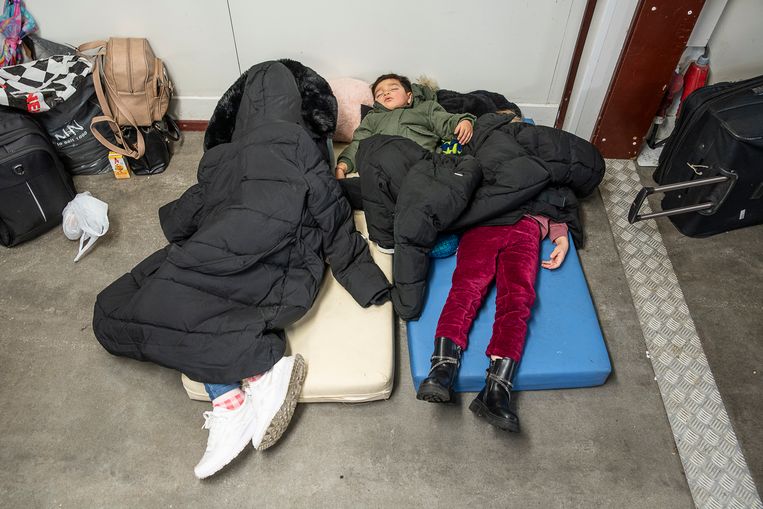With the extreme right hot on its heels, the European Union is trying to regain control of the migration issue by taking strict measures. As Europe moves to the right, populists are discovering how difficult it is to limit immigration.
Manfred Weber, leader of the Christian Democrats in the European Parliament, told reporters in Brussels this week that if Europe cannot stop the boats in the Mediterranean, the far right could win the 2024 European elections. “We need a solution. If we fail, We risk putting the whole of Europe in a difficult situation.”
In the latest poll, the number of seats for the two extreme right groups in the European Parliament increased from 138 to 167 seats, in a parliament that includes 705 seats. A limited win, but Geert Wilders' win left a big impression in Europe. Things can move quickly for populists. At the national level, politicians also feel the hot breath of the far right on their necks. In France, Marine Le Pen's party is leading in opinion polls, in Austria the Austrian Freedom Party is leading, and in Germany the Alternative for Germany party is recording better results than ever before.
The immigration issue is pulling an entire continent to the right. The centrist parties are trying hard to regain control through tough measures. A tough immigration law was passed in France this week, and Germany reimposed border controls with Poland. The Migration Pact was finally introduced in Brussels, eight years after the major refugee crisis in 2015.
Many practical questions
On paper it seems obvious. Asylum seekers are separated at European external borders. Those who have little chance are detained and, after a quick procedure, returned to their country of origin. Only the most promising asylum seekers are allowed to continue, pending a decision.
However, the plan raised many practical questions. What to do with asylum seekers who are still traveling to northern Europe? Will they be sent back to camps in Italy or Greece? Aren't the rights of asylum seekers being violated in an extremely hasty procedure? The most important question of all: Is it possible to return rejected asylum seekers to their country of origin? Without this option, giant, overcrowded concentration camps risk developing in Italy and Greece.
In addition, center-right parties in particular suffer from a major political problem. Their voters expect tough measures against immigration. But this approach can turn against the center right, as the Dutch elections showed. VVD leader Jeselgoz has made immigration the spearhead of her campaign and opened the door to a Party for Freedom. This left the VVD vulnerable to competition from Geert Wilders, who had made immigration a central issue for two decades.
Voters prefer the original version over the copy, in the words of French populist leader Jean-Marie Le Pen.
Not only the consequences for immigration
The center-right position normalizes far-right ideas. In France, an immigration law passed this week was pulled so far to the right by Parliament that Marine Le Pen considered it an “ideological victory” for her party. French President Macron wrote, “He who was elected twice to stop the far right, passed on the ideas of the far right.” Le Monde In a comment.
The center right is in crisis all over the world, German political scientist Thomas Bibercher wrote in his book published last year. Dead/right. He says this has serious consequences. The traditional conservative parties were moderate, possessed an administrative temperament and a great sense of responsibility. After 1945, the Christian Democrats were the driving force behind European cooperation.
If the far right overwhelms the center right, this will not only have consequences for immigration policy. European cooperation is becoming more difficult, and nature and climate policies are under serious pressure.
Complex issue
Ironically, once populists come to power, they notice how difficult it is to reduce immigration numbers. Last weekend, Italian Prime Minister Giorgia Meloni and British Prime Minister Rishi Sunak appeared at the far-right Atrego festival in Rome.
Rishi Sunak said Europe was at risk of being “swamped” by migration. After Brexit – with logo Take back control – Immigration to the UK has only increased. Now Sunak and Meloni want to rewrite international treaties that, in their view, stand in the way of tough immigration policy. We will no doubt hear this more in the coming years: international treaties need comprehensive reform.
Meloni promised to stop immigration through a “naval blockade.” But this year, there are 55 percent more migrants in Italy than in 2022. In addition, Meloni has had to accept 425,000 legal migrant workers in order to keep Italy's rapidly aging economy going.
Wild reality
Meloni described migration as “the most complex phenomenon I have ever dealt with.” She admitted that the results were lower than expectations, but said she was not interested in taking quick measures that did not fundamentally solve the problem.
As the center-right continues to crack down on immigration, “post-fascist” Meloni suddenly looks like an old politician telling the “honest story,” as her campaign promises collide with a harsh reality.

“Lifelong food practitioner. Zombie geek. Explorer. Reader. Subtly charming gamer. Entrepreneur. Devoted analyst.”











More Stories
You will encounter this while crossing into England
Vladimir Putin is sworn in as President of Russia – for the fifth time: “He will continue along the path he has chosen, with victory in Ukraine the No. 1 priority.”
Slugs and snails are all eating up your garden: ‘Record year, all gone’ | RTL News